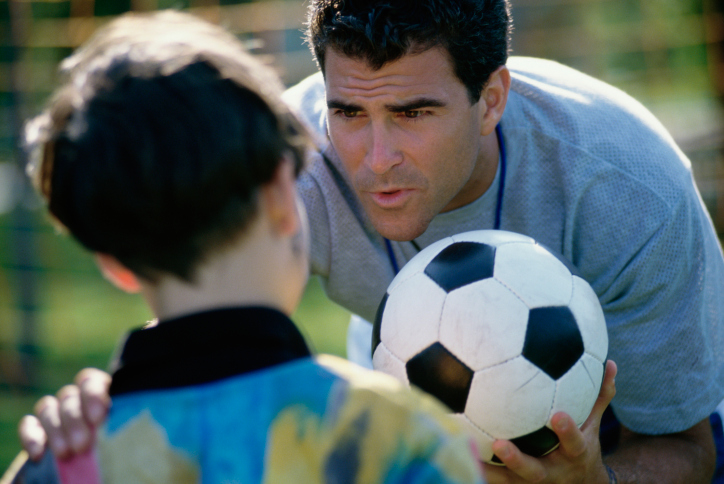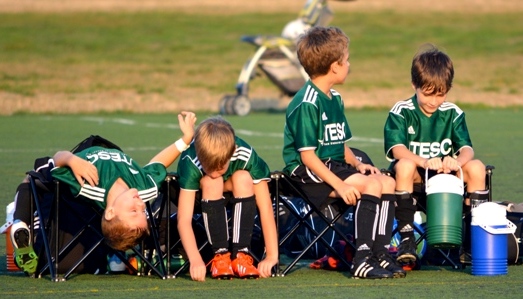Youth sports can become an all encompassing component of childhood, and for that matter, parenthood. As we shuttle kids to practices, games and tournaments, we can easily forget about the big picture. We can lose sight of the main reasons we put kids in sports in the first place. If we want our children to be high performers – and most importantly, happy young athletes – then we cannot lose perspective. We need to take the time to reinforce 5 core messages for our children. Whether they are 6 or 16, if you remind your athlete about these 5 things, it will help them keep everything in perspective.
- “Have Fun!”
Our kids play because it is fun. Our kids train because it is fun. When it stops being fun, then our kids lose interest and quit. You can still push your kids, and they can still be great performers while having fun. In fact, the only way they will ever be truly great performers is by having fun. Take the time to remind them to smile, to enjoy sports, and be cognizant of the signs that they are not having fun anymore. These signs can include things like not wanting to go to games or practices, not asking to play in the backyard or outside of organized practice, or just a less then enthusiastic attitude when it comes time to practice or play a game.
By the same token, if your child can’t wait to put on their uniform, or is always asking you to go and play with them in the yard, then be excited. This enthusiasm comes from a situation that your child is enjoying, and should be nourished. Demonstrate to your child that you are as excited as they she is, and take a few minutes to play catch or kick the ball around. Your child will appreciate it, and you will be confident that that the sport or activity they are participating in is a fun one.
- “Work Hard!”
In other words, praise kids for their effort, not outcomes. Too often in youth sports we become fixated on the results, on the wins and losses, and we lose sight of the process. Numerous scientific studies have shown that children who are praised for their effort, rather then the outcome of an event or a test, perform significantly better in future tests. They grow to value hard work (which they control) over results (which are often out of their control). This gives them ownership over their activity.
I first read about this focus on praising effort when my son was 4 years old. He was just beginning to show an interest in drawing and coloring, and I wanted to encourage him to keep at it. As a result, every time he brought me his typical 4 year old drawing or coloring page, I made a conscious effort to say “Wow, you must have worked very hard on that” instead of saying “great picture” or “That’s beautiful.” About 2 months into this experiment, my son started bringing me pictures and saying “Daddy, look how hard I worked on this.” I have to admit I was a bit stunned, but also quite pleased. My four year old had learned that it was his effort that was valued, and never the outcome.
Now back to youth sports. It is very easy to judge our children’s worth on the outcome of games, on wins and losses, and not the effort they put in. But when we think about it, so many things that effect an outcome (referees, weather, opponent, luck) are not within our child’s control. If we teach them that outcomes matter, then they can very easily become discouraged by poor outcomes, even when their effort was fantastic. As a result, they may either quit, or stop seeking challenges, so as to achieve only positive outcomes. Neither is a healthy thing.
Instead, make sure that you remind your child that his effort and commitment are within his control. Remind him that if he gives 100% effort with 100% focus, then the rest will eventually take care of itself. Teach him that if he controls the controllables then he has already succeeded. Teach him that a poor effort is not acceptable, regardless of the outcome of a game. This is a lesson that will take him far in life.
- “It’s OK, things happen.”
Failure is a necessary component of success. In our accomplishment driven world, we often overlook how many of today’s greatest achievers failed many times before we came to know them as a success. Steve Jobs got fired from Apple before he made it the greatest company in the world. Donald Trump has declared bankruptcy too many times to count. And, as Michael Jordan said:
“I’ve missed over 9,000 shots in my career. I’ve lost almost 300 games. 26 times I’ve been trusted to take the game-winning shot… and missed. I’ve failed over and over and over again in my life. And that is why I succeed.”
It is our natural instinct to protect our children from failure, and its perceived consequences. From the time they first climb the jungle gym, and we stand ready to catch them, to their first experience with a coach who challenges them, we want to protect our kids. But we must remind ourselves that failure is important part of learning, and that we need to use our mistakes and setbacks to become better. Sport is perhaps the safest environment for kids to try, and fail, and try again. Failure in sport rarely has life long consequences. So take a step away and allow your child to fail.
One of the best ways to do this is to remember a time in your life that you are very proud of, an achievement of yours which was not required of you, which took a lot of work and dedication, and had its ups and downs along the way. We have all had many of these times. Share this with your child, and show them how you are most proud of this achievement because it came easy, but because it was hard, and worth achieving. Do not discount their disappointment or tell them “it doesn’t matter,” because at that moment it does matter to your kids. Instead, respect how they are feeling, but tell them how you have been in their shoes, and how you overcame it.
Allowing your children to fail – and reminding them that you failed at times as well – is a great way to not only help your child become a better athlete, but a better person. Along the way, you will develop a stronger relationship with your child. And perhaps that is the best achievement of all.
- “It’s Like School.”
Remind your children that learning sports, like learning math or reading, takes time. It does not happen in 6 days, or six weeks, or even sometimes in six years. Kids can easily get frustrated when they do not pick up sports right away, especially if they believe that your love for them is tied to their performance and the outcome of the games (see #5 for more on this). Focus on the process of learning, help them set measurable and timely goals and note their improvement. “Wow, what a great kick. You couldn’t do that last month” will light up a child’s smile, and remind them that their hard work is noticed, and paying off.
While doing this, remind yourself that this is like school as well. Constantly coaching your child from the sideline (unless you are the coach) tells her that you do not trust her to make the right choices, the right passes, or run to the right place. You would not stand over her shoulder at night critiquing her math homework fraction by fraction; make sure you don’t do the same thing every Saturday at her game.
And finally…
- “I love watching you play.”
There is not more powerful message that you can send to your child then to remind them, with your words and actions, that you love watching them play, and that you love them no matter what. While this may seem like common sense, and our immediate thought is “Of course my child knows I love him,” think about it this way. Children listen to what we say, but they remember what we do. We can say “I love you” till we are blue in the face, but if we cover our face when they make mistakes, if we clam up or act depressed when thier team loses, our actions are saying something else entirely. Watch your child next time she plays, and see if she looks at you for approval when she scores (and you are cheering) and when she makes an error (are you still cheering and smiling?). Make it a habit to tell her how much you love to watch her play sports, then go get an ice cream no matter the result.
The youth sports world can be complex and confusing. It can also be incredibly rewarding and life changing for the families who know how to strengthen family binds, and teach life lessons, through sport. Regardless of your child’s age or ability, reinforcing the 5 messages above will go a long way toward ensuring that your child loves to participate in sports, and views their youth sports experience in a positive light.












Comments